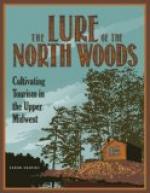“Can you give me two or three weeks?” she asked. “I want to consult my friends.”
“The delay might upset my plans. For one thing, it would be necessary to get as much work as possible done before the thaw comes. Prospecting is difficult in winter, but it’s considerably easier traveling when the rivers are frozen, and first of all we want to find the spot. I daresay you could give me some landmarks that would help us.”
Agatha hesitated. Strange had often described the neighborhood where he had found the ore, and she saw that what she knew about it might be important. Stormont’s explanation of his anxiety to begin the search was plausible; but it was possible he wanted to prevent her asking advice.
“I must wait until I know what my friends think,” she insisted.
“Although the loss of time may spoil our chance of locating the ore?”
“Yes,” said Agatha firmly. “I must run the risk.”
Stormont got up. “Very well! I don’t know if we’ll be able to do anything when you make your decision, but you can write to me. In the meantime, I think you ought to promise that you won’t negotiate with anybody else.”
“I will promise this,” said Agatha and knitted her brows when he went out.
She was half afraid she had been too prudent and let a good offer go by; but although it might bring her trouble and disappointment, she would sooner look for the ore herself. She had sometimes shrunk from the task, but after all it was her duty. Then she could not ask George for advice. He had never believed in the lode and would, no doubt, tell her she was lucky to get an offer, and had better make the best bargain she could. Farnam knew nothing about mining; he was absorbed in his orchard, and Mabel now and then declared that his judgment was only worth trusting about fruit trees.
Agatha paused and admitted that she had from the beginning meant to ask Thirlwell. She could trust him; he was honest, but this was not all. When he talked about important things he had a quiet, decided manner that she liked. He would not be daunted by obstacles, and if her resolution wavered, he would not let her shirk. She did not think him clever, but he would somehow carry out what he undertook. It was curious that after a fortnight of his society she knew him so well; but she did know he was trustworthy and there was nothing more to be said.
Since a letter might not reach him for some time, she had better write at once, and she got some paper and began. It was easy to write to Thirlwell, and she told him about the lame man who had broken into the house, before she came to Stormont’s offer. Indeed, when she stopped she was surprised to see how much she had said. After fastening the envelope she got up and went to the window, where she drew the thick curtain behind her and looked out.
The moon was higher up the sky and the roofs glittered in the silver light. Half the street lay in shadow, a belt of grayish blue, but the rest sparkled where the sleigh-shoes had run. A sleigh came up with a load of girls and young men in blanket-coats and furs. They seemed to be talking and laughing, but Agatha no longer envied them; the depression she had felt had gone. Then as the sleigh went past with a chime of bells she tried to follow her letter on its journey to the North.




